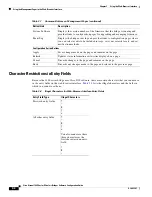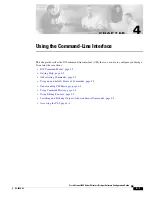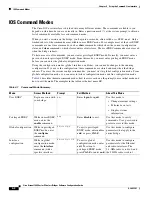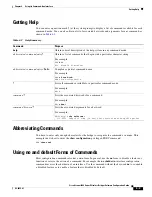
5-2
Cisco Aironet 1400 Series Wireless Bridges Software Configuration Guide
OL-4059-01
Chapter 5 Administering the Bridge
Preventing Unauthorized Access to Your Bridge
Preventing Unauthorized Access to Your Bridge
You can prevent unauthorized users from reconfiguring your bridge and viewing configuration
information. Typically, you want network administrators to have access to the bridge while you restrict
access to users who connect through a terminal or workstation from within the local network.
To prevent unauthorized access to your bridge, you should configure one of these security features:
•
Username and password pairs, which are locally stored on the bridge. These pairs authenticate each
user before that user can access the bridge. You can also assign a specific privilege level (read only
or read/write) to each username and password pair. For more information, see the
“Configuring
Username and Password Pairs” section on page 5-5
. The default username is
Cisco
, and the default
password is
Cisco
. Usernames and passwords are case-sensitive.
•
Username and password pairs stored centrally in a database on a security server. For more
information, see the
“Controlling Bridge Access with RADIUS” section on page 5-7
.
Protecting Access to Privileged EXEC Commands
A simple way of providing terminal access control in your network is to use passwords and assign
privilege levels. Password protection restricts access to a network or network device. Privilege levels
define what commands users can issue after they have logged into a network device.
Note
For complete syntax and usage information for the commands used in this section, refer to the
Cisco IOS
Security Command Reference for Release 12.2
.
This section describes how to control access to the configuration file and privileged EXEC commands.
It contains this configuration information:
•
Default Password and Privilege Level Configuration, page 5-2
•
Setting or Changing a Static Enable Password, page 5-3
•
Protecting Enable and Enable Secret Passwords with Encryption, page 5-4
•
Configuring Username and Password Pairs, page 5-5
•
Configuring Multiple Privilege Levels, page 5-6
Default Password and Privilege Level Configuration
Table 5-1
shows the default password and privilege level configuration.
Table 5-1
Default Password and Privilege Levels
Feature
Default Setting
Username and password
Default username is
Cisco
and the default password is
Cisco.
Enable password and privilege level
Default password is
Cisco
. The default is level 15 (privileged EXEC
level). The password is encrypted in the configuration file.
















































